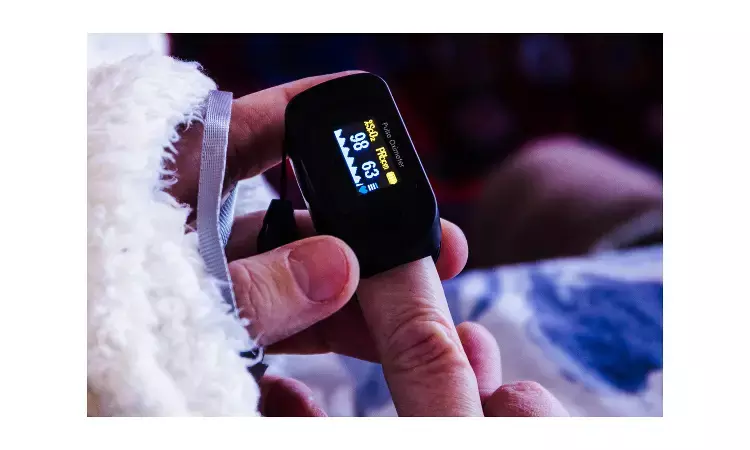- Home
- Medical news & Guidelines
- Anesthesiology
- Cardiology and CTVS
- Critical Care
- Dentistry
- Dermatology
- Diabetes and Endocrinology
- ENT
- Gastroenterology
- Medicine
- Nephrology
- Neurology
- Obstretics-Gynaecology
- Oncology
- Ophthalmology
- Orthopaedics
- Pediatrics-Neonatology
- Psychiatry
- Pulmonology
- Radiology
- Surgery
- Urology
- Laboratory Medicine
- Diet
- Nursing
- Paramedical
- Physiotherapy
- Health news
- Fact Check
- Bone Health Fact Check
- Brain Health Fact Check
- Cancer Related Fact Check
- Child Care Fact Check
- Dental and oral health fact check
- Diabetes and metabolic health fact check
- Diet and Nutrition Fact Check
- Eye and ENT Care Fact Check
- Fitness fact check
- Gut health fact check
- Heart health fact check
- Kidney health fact check
- Medical education fact check
- Men's health fact check
- Respiratory fact check
- Skin and hair care fact check
- Vaccine and Immunization fact check
- Women's health fact check
- AYUSH
- State News
- Andaman and Nicobar Islands
- Andhra Pradesh
- Arunachal Pradesh
- Assam
- Bihar
- Chandigarh
- Chattisgarh
- Dadra and Nagar Haveli
- Daman and Diu
- Delhi
- Goa
- Gujarat
- Haryana
- Himachal Pradesh
- Jammu & Kashmir
- Jharkhand
- Karnataka
- Kerala
- Ladakh
- Lakshadweep
- Madhya Pradesh
- Maharashtra
- Manipur
- Meghalaya
- Mizoram
- Nagaland
- Odisha
- Puducherry
- Punjab
- Rajasthan
- Sikkim
- Tamil Nadu
- Telangana
- Tripura
- Uttar Pradesh
- Uttrakhand
- West Bengal
- Medical Education
- Industry
Sleep-related hypoxia associated with worse outcomes in patients with COVID-19: Study

Cleveland, Ohio: A case-control study by Dr. Cinthya Pena Orbea, MD, and the team revealed that sleep-disordered breathing (SDB) and sleep-related hypoxia is not related to an increased likelihood of contracting SARS-CoV-2 but sleep-related hypoxia is an associated risk factor for harmful COVID-19 outcomes. The findings of the study are published in JAMA Network Open.
Effects of SARS- CoV-2 on sleep-disordered breathing is a common disorder with a range of harmful sequelae. The influence of SDB and sleep-related hypoxemia in SARS-CoV-2 viral infection and COVID-19 outcomes remains unknown. Given the concern for aerosolization with limited data to inform professional society recommendations, whether to continue treatment for SDB with positive airway pressure remains controversial.
The objective of the study was therefore to investigate the association of SDB and sleep-related hypoxia with SARS-CoV-2 positivity and World Health Organization (WHO)-designated COVID-19 clinical outcomes while accounting for confounding including obesity, underlying cardiopulmonary disease, cancer, and smoking history.
The case-control study was conducted within the Cleveland Clinic Health System (Ohio and Florida) and included all patients who were tested for COVID-19 between March 8 and November 30, 2020 and an available sleep study record. Sleep study identified SDB using the Apnea-Hypopnea Index [AHI] and sleep-related hypoxemia. Outcomes were SARS-CoV-2 infection and WHO-designated COVID-19 clinical outcomes.
A total of 350 710 individuals tested for SARS-CoV-2, 5402 age, 56.4 years; 3005 women had a prior sleep study, of whom 1935 (35.8%) tested positive for SARS-CoV-2.
The results of the study were:
• Patients who were positive vs negative for SARS-CoV-2 had a higher AHI score (median, 16.2 events/h vs 13.6 events/h) and increased TST <90 median, 1.8% sleep time vs 1.4% sleep time.
• Median TST <90 was associated with the WHO-designated COVID-19 ordinal clinical outcome scale (adjusted odds ratio, 1.39).
• Time-to-event analyses showed sleep-related hypoxia associated with a 31% higher rate of hospitalization and mortality (adjusted hazard ratio, 1.31).
Dr. Orbea, and the team concluded that "In this case-control study, SDB and sleep-related hypoxia were not associated with increased SARS-CoV-2 positivity; however, once patients were infected with SARS-CoV-2, sleep-related hypoxia was an associated risk factor for detrimental COVID-19 outcomes."
"Baseline sleep-related hypoxia may portend worse clinical prognosis in COVID-19," they wrote.
Reference: Pena Orbea C, Wang L, Shah V, et al. Association of Sleep-Related Hypoxia With Risk of COVID-19 Hospitalizations and Mortality in a Large Integrated Health System. JAMA Netw Open. 2021;4(11):e2134241. doi:10.1001/jamanetworkopen.2021.34241
Medical Dialogues consists of a team of passionate medical/scientific writers, led by doctors and healthcare researchers. Our team efforts to bring you updated and timely news about the important happenings of the medical and healthcare sector. Our editorial team can be reached at editorial@medicaldialogues.in.
Dr Kamal Kant Kohli-MBBS, DTCD- a chest specialist with more than 30 years of practice and a flair for writing clinical articles, Dr Kamal Kant Kohli joined Medical Dialogues as a Chief Editor of Medical News. Besides writing articles, as an editor, he proofreads and verifies all the medical content published on Medical Dialogues including those coming from journals, studies,medical conferences,guidelines etc. Email: drkohli@medicaldialogues.in. Contact no. 011-43720751


